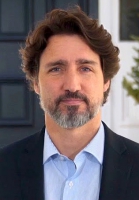| Birth Place: | 加拿大安大略省渥太华渥太华医院 | ||||||
| |||||||
Justin Pierre James Trudeau PC MP (/ˈtruːdoʊ, truːˈdoʊ/, ![]() listen; French: [ʒystɛ̃ tʁydo]; born December 25, 1971) is a Canadian politician who has served as the 23rd prime minister of Canada since 2015 and has been the leader of the Liberal Party since 2013. Trudeau is the second-youngest Canadian prime minister after Joe Clark; he is also the first to be related to a previous holder of the post, as the eldest son of Pierre Trudeau.
listen; French: [ʒystɛ̃ tʁydo]; born December 25, 1971) is a Canadian politician who has served as the 23rd prime minister of Canada since 2015 and has been the leader of the Liberal Party since 2013. Trudeau is the second-youngest Canadian prime minister after Joe Clark; he is also the first to be related to a previous holder of the post, as the eldest son of Pierre Trudeau.
Born in Ottawa, Trudeau attended Collège Jean-de-Brébeuf, graduated from McGill University in 1994, and then the University of British Columbia in 1998. He has a bachelor of arts degree in literature and a bachelor of education degree. After graduating, he worked as a teacher in Vancouver, British Columbia. He started studying engineering at Montreal's École Polytechnique in 2002 but dropped out in 2003. Beginning in 2004, he took one year of a master's program in environmental geography at McGill University but, again, left without graduating in 2005. He has also held jobs including camp counselor, nightclub bouncer, and snowboard instructor.
In the 2008 federal election, he was elected to represent the riding of Papineau in the House of Commons. In 2009, he was appointed the Liberal Party's critic for youth and multiculturalism, and the following year, became critic for citizenship and immigration. In 2011, he was appointed as critic for secondary education and sport. Trudeau won the leadership of the Liberal Party in April 2013 and led his party to victory in the 2015 federal election, moving the third-placed Liberals from 36 seats to 184 seats, the largest-ever numerical increase by a party in a Canadian federal election. As Prime Minister, major government initiatives he undertook during his first term included legalizing recreational marijuana through the Cannabis Act; attempting Senate appointment reform by establishing the Independent Advisory Board for Senate Appointments; establishing the federal carbon tax and negotiating trade deals such as the United States-Mexico-Canada Agreement and the Comprehensive and Progressive Agreement for Trans-Pacific Partnership; while later grappling with controversies surrounding the SNC-Lavalin affair.
Winning the most seats (157) in the 2019 federal election, the Liberals formed a minority government, despite losing the popular vote and receiving the lowest percentage of the national popular vote of any governing party in Canadian history.
